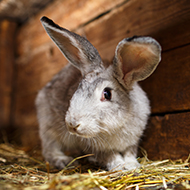Thirty-one per cent of UK rabbits in inadequate housing

The research also identified that half of UK rabbits live alone.
A new study from the University of Liverpool has discovered that 31.2 per cent of UK rabbits are being housed in inappropriate environments, such as hutches and small cages.
Researchers examined data from the PDSA Animal Wellbeing (PAW) Report from 2017 to 2019, sampling 1,333 rabbit owners in the UK.
Despite rabbits enjoying the status of third most popular pet in the country, research has highlighted a low awareness among the general public of specific rabbit welfare requirements.
Inadequate housing provision was reported by owners across a wide spectrum of ages, genders and deprivation levels, however, researchers identified particular demographic groups as being most likely to do so.
These groups included male owners aged 25-34 years old, owners with a below-average household income and owners living in deprived areas. Despite this, the researchers warn that the study cannot determine a causal effect, with more research required to determine the factors behind these associations.
Grace Mee, first author of the study who completed the research during her time at the university studying for a veterinary degree, commented: “Rabbit sales increased by over 200% in 2020, which was more than that of cats or dogs. However, rescue centres are now currently overwhelmed with unwanted pet rabbits.
“As the third most common pet, I hope that our research will help in providing resources where they will be most helpful to support owners in meeting the welfare needs of their rabbits.”
In identifying particular owner demographics that may need more targeted resources, the researchers suggest that all owners should receive clear and consistent advice regarding rabbit housing, as it is widely misunderstood at all demographic levels, but that there is a potential emphasis target audience for pre- and post-sale education.
Dr Carri Westgarth, project supervisor and senior lecturer in human-animal interaction at the University of Liverpool, said: “It is essential that there is a shift in rabbit hutch manufacture – rabbits need space and this should be reflected in commercially available housing options for owners.
“Vets, pet shops, breeders and rescue centres can also help by educating potential owners on the specific requirements of rabbit care.”
Published in Veterinary Record, 'Owner demographic factors are associated with suitable pet rabbit housing provision in the United Kingdom' is available to read via this link, and is open access.



 RCVS Knowledge has welcomed Professor Peter Cockcroft as editor-in-chief for Veterinary Evidence.
RCVS Knowledge has welcomed Professor Peter Cockcroft as editor-in-chief for Veterinary Evidence.